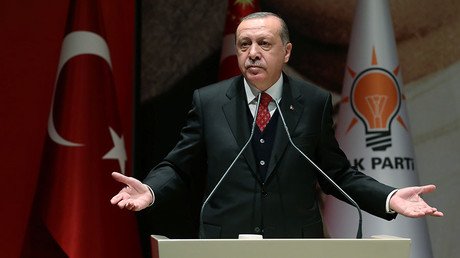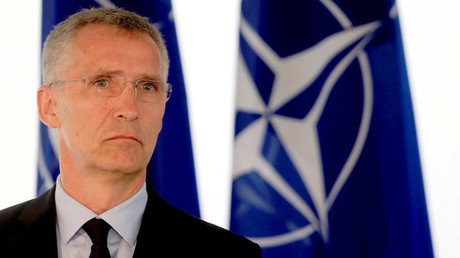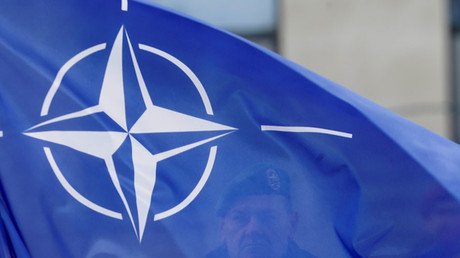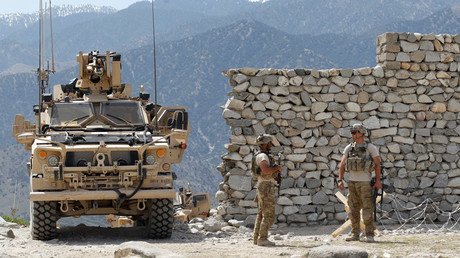Jens Stoltenberg's greatest hits, as NATO extends his gaffe-riddled reign
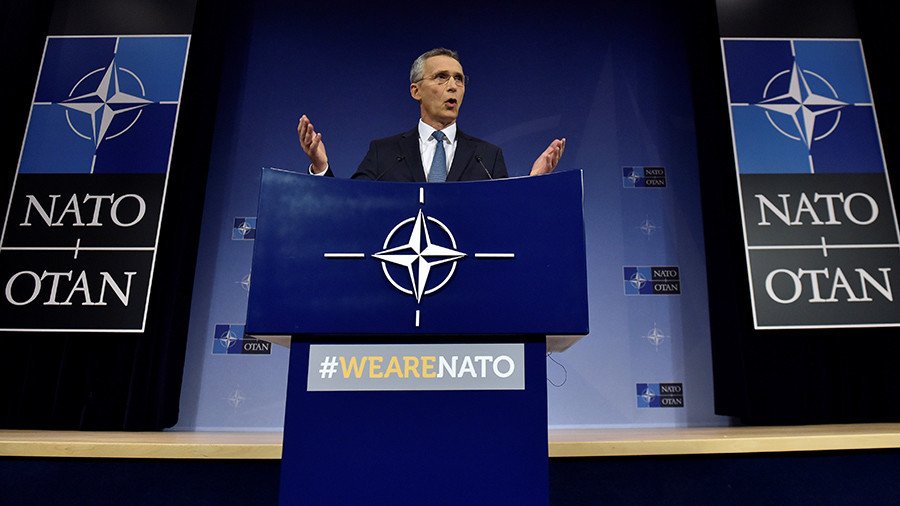
NATO’s Secretary-General Jens Stoltenberg has been given another two years at the helm of the world’s most offensive defensive alliance. NATO said in a statement Tuesday that the 29 allies had decided to prolong Stoltenberg’s term until September 30, 2020.
The former Norwegian prime minister has served as NATO’s Secretary-General since October 2014 – and he already has so much to be proud of. Here are just a few of Jens’ greatest NATO hits.
Stoltenberg does damage control after NATO exercises mistakenly target a member state
Stoltenberg attempted to salvage NATO’s already precarious relationship with member state Turkey in November, after a Trident Javelin exercise in Norway depicted Turkish President Recep Tayyip Erdogan on an “enemies chart.” During the computer-assisted exercise, Turkish founding father Mustafa Kemal Ataturk was shown in a “hostile leader list.” Erdogan’s name and portrait were also used during a simulated “enemy collaborator” chat from the same exercise. Outraged by the slight from its own allies, Turkey withdrew 40 troops from the exercises.
"Yesterday, you have witnessed the impudence at NATO exercises in Norway. There are some mistakes that cannot be committed by fools but only by vile people,” Erdogan said in a televised speech after the screw-up became public. He added that the incident shows “a reflection of a distorted point of view that we have observed in NATO for a while."
NATO apologized for the incident, which it blamed on a Norwegian civilian contractor. In a statement, Stoltenberg stressed that the contractor’s actions did not represent NATO’s values. Similar statements came from Norway’s Defense Ministry.
Stoltenberg says blatant mission creep in Libya was part of UN-sanctioned mandate
In a May interview, Stoltenberg insisted that NATO’s bombardment of Libya in 2011 “protected civilians” and was part of a “clear UN mandate.”
Then-Secretary General Anders Rasmussen explained NATO’s mandate in very clear terms in March 2011, stating that NATO would accept responsibility for “enforcing the No-Fly Zone with the aim to protect the civilian population, and the mandate doesn't go beyond that.” He added: “Of course we can act in self-defense, but what we will do is to enforce the No-Fly Zone and ensure that we protect the civilian population.”
The problem is that NATO (and a coalition of Arab states that wanted to depose Libyan leader Muammar Gaddafi) did far, far more than just enforce a no-fly zone and “protect” civilians. As CNN reported in August 2011, “Special forces troops from Britain, France, Jordan and Qatar on the ground in Libya have stepped up operations in Tripoli and other cities in recent days to help rebel forces as they conducted their final advance on the [Gaddafi] regime, a NATO official confirmed to CNN Wednesday.”
The British press was even less timid about publicizing NATO’s extra-curricular activities in Libya. In January 2012, the BBC reported on the “inside story of the UK's secret mission to beat Gaddafi.” The story begins by boasting that “British efforts to help topple Colonel Gaddafi were not limited to air strikes. On the ground – and on the quiet – special forces soldiers were blending in with rebel fighters. This is the previously untold account of the crucial part they played.”
As for NATO “protecting” Libyan civilians, how would Stoltenberg know? NATO never took a particular interest in discovering who was killed in its airstrikes. Right up until the end of its Libya campaign, NATO insisted that there were no “confirmed” cases of the alliance killing civilians. The reason for this was very simple: As the New York Times reported in December 2011, “the alliance had created its own definition for ‘confirmed’: only a death that NATO itself investigated and corroborated could be called confirmed. But because the alliance declined to investigate allegations, its casualty tally by definition could not budge — from zero.”
Stoltenberg really upset about deadly explosion in Serbian city bombed by NATO
After an explosion in February left at least one person dead at Serbia’s Kragujevac Military Facility, Stoltenberg sent his deepest and most sincere condolences to the people of Serbia: “I am saddened to hear of the explosions … My thoughts and deep sympathy are with all those affected and with the Serbian people,” Stoltenberg said in a statement. “As the Serbian authorities are working to establish the facts of this tragedy, I want to convey NATO's solidarity at this difficult time. Serbia is NATO's neighbor and a valued partner,” he added.
Stoltenberg tiptoed around the rather prickly fact that NATO had bombed Kragujevac in 1999. A BBC report from March 24, 1999 notes that NATO strikes included “hits against the Zastava weapons plant in Kragujevac.”
It’s unclear whether NATO has ever apologized for those series of explosions.
Stoltenberg announces NATO-Russia meeting – but forgets to consult with Moscow
Russia’s Foreign Minister Sergey Lavrov was surprised to learn that he would be attending a meeting with Stoltenberg – without first being consulted.
In May 2016, NATO announced that it would hold formal talks with Russia before the alliance convened for its Warsaw summit in July. But Moscow was never consulted about any such meeting.
“Why on earth did he say that? The Russia-NATO council works on the basis of consensus,” Interfax cited Lavrov as saying, expressing Moscow’s “bewilderment.”
Stoltenberg says NATO reserves the right to bomb anyone suspected of “cyberattacks”
As Secretary General, one of Stoltenberg’s key tasks is to justify why NATO members need to spend mammoth sums on American weapons – and Jens excels at identifying potential reasons to bring those guns to bear.
Hackers could be one such reason, he told Germany’s Bild newspaper in June 2016.
“A severe cyberattack may be classified as a case for the alliance. Then NATO can and must react,” the newspaper quoted Stoltenberg as saying.
Setting aside some of the more obvious and distressing implications of this policy, what exactly would happen if a nation wrongly accused of hacking America’s power grid was NATO-bombed in retaliation?
READ MORE: Facts force Washington Post to backtrack on report that Russia hacked US power grid
Stoltenberg tries to sing
And finally: A video of Stoltenberg singing “We are the world” with his NATO buddies.
Here’s to two more years!
